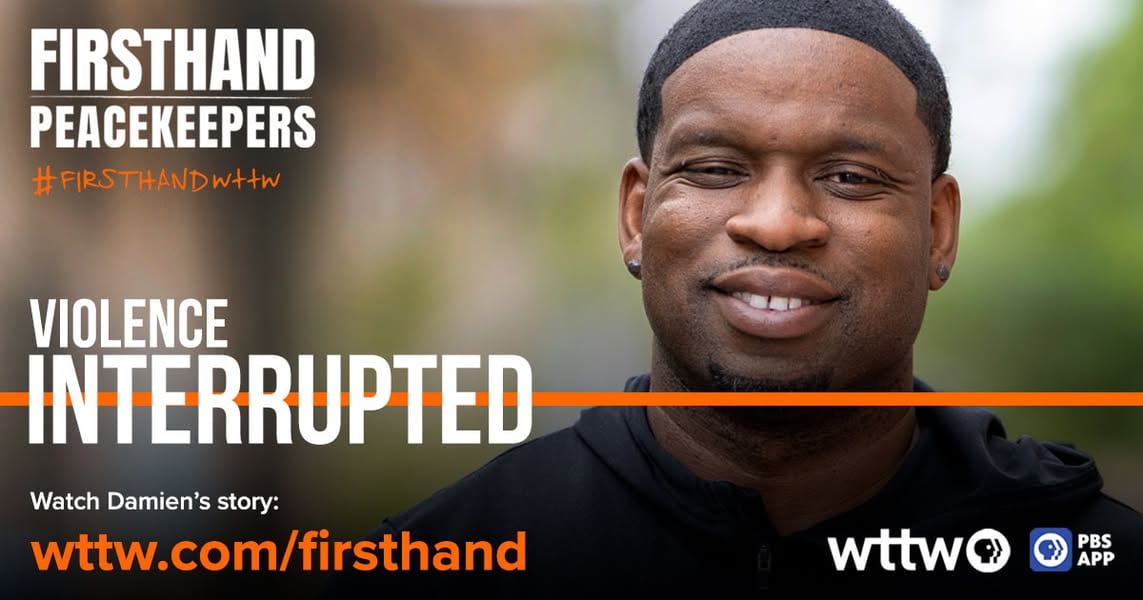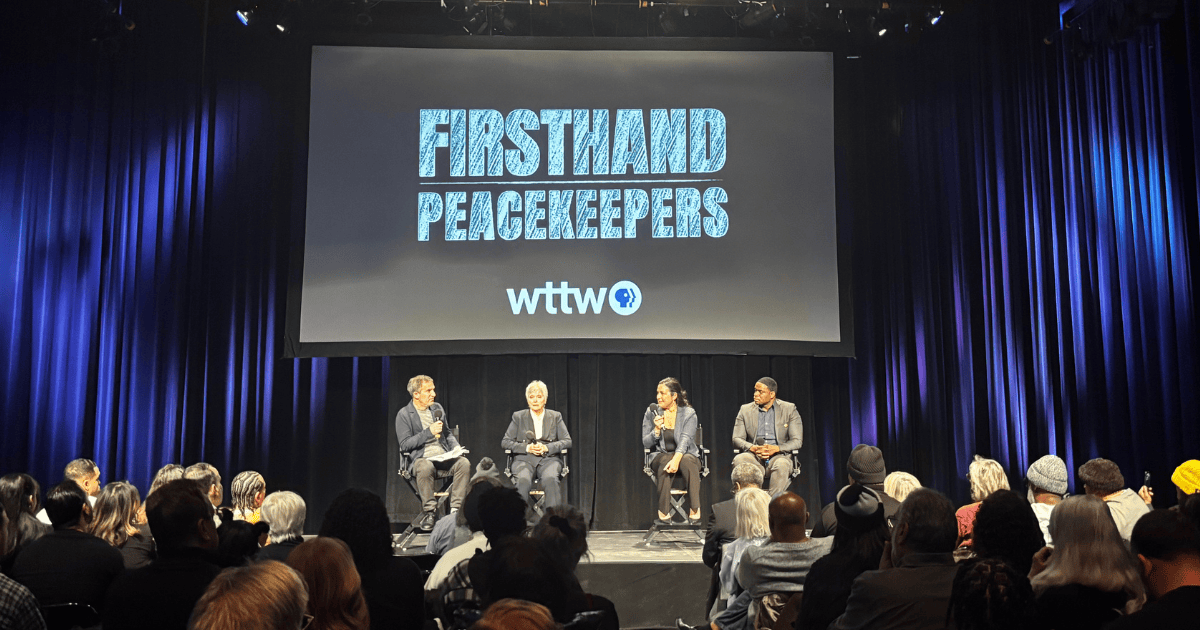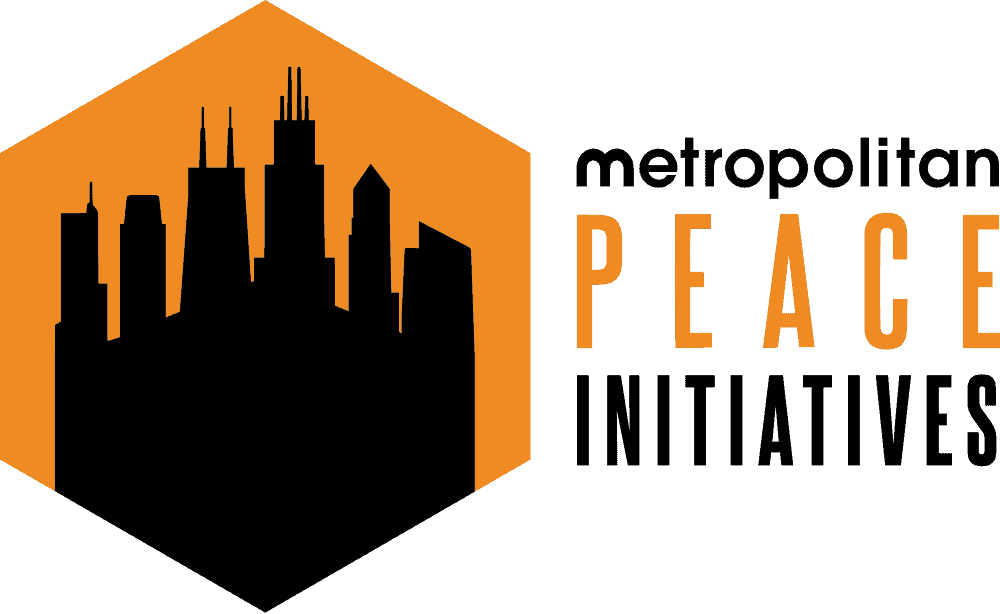Peacekeepers: WTTW Features Community Violence Interventionists in New Docuseries

Attendees gathered at WTTW Studios in Albany Park on Monday, February 17, for a screening and panel discussion with the subjects of the new docuseries FIRSTHAND: Peacekeepers, which spotlights the struggles and triumphs of five individuals engaged in community violence intervention (CVI) work across Chicago.
This season features Damien Morris, Chief Program Officer of Violence Prevention at Breakthrough Urban Ministries; Judge Patricia Spratt of the Illinois Circuit Court of Cook County and the North Lawndale Restorative Justice Community Court; Diane Latiker, activist and founder of Kids Off The Block; Adrian Rodriguez, violence prevention leader at the Puerto Rican Cultural Center and co-owner of the Battle Bandera Boxing Club; and Cedric Hawkins, the Strategic Initiatives Manager at Chicago CRED.
Joining the panel discussion was Morris, Judge Spratt, and Kathryn Bocanegra, clinical researcher and Assistant Professor at Jane Addams College of Social Work at University of Illinois Chicago. The discussion was hosted by Dan Protess, Co-Executive Producer of the series, and included previews of the show, which follows the Peacekeepers through their day-to-day.
The work is challenging, and as Morris describes, “boots-on-the-ground.” Morris’ episode follows as he responds to a shooting incident involving the son of another community violence interventionist. The organization Morris serves, Breakthrough, is part of a larger coalition of organizations doing similar work in Chicago, also known as Communities Partnering 4 Peace (CP4P). Morris received training in the field from the Metropolitan Peace Academy, an intensive violence prevention academy, led by Metropolitan Peace Initiatives, that professionalizes the field of street outreach and victim services.

During the discussion, Morris described having to be almost like a community superhero, remaining calm during dangerous situations and being a reliable, trustworthy person to turn to in times of conflict. He described his engagement as relentless: “You have to go above and beyond. Regardless of if you tell me ‘no’ today, I’m coming back tomorrow. Some way, somehow, I’ll get you to buy in.”
“We wear many hats,” explained Morris. “I may need to be a Case Manager, a Victim Advocate. Whatever it takes for me to get you to change the trajectory of your life, that’s what I’m gonna do.”
“They’re not preventing violence by sending emails,” Bocanegra explained, “but by door-knocking, being on the block at odd hours when most of us are sleeping. They’re willing to go back into the most painful experiences of their life to try and create a pathway for others to find their way out.”
For Judge Spratt’s part, she deals in restorative justice. Different from retributive court, this system allows for individuals aged 18-24 with nonviolent offenses to avoid conviction, regain community trust, and set stable life goals. The meetings are held at UCAN Chicago, another CP4P partner.
“We have resources available to us, a whole bevy of Case Managers who all work in tandem to make sure people are safe. This is not part of the court. This is just people with good hearts.”
For this work to continue, there needs to be continued investment in programs and advocacy for legislation. Community violence intervention programs are supported in part by the Partnership for Safe and Peaceful Communities (PSPC), a coalition of philanthropic organizations that support violence prevention efforts in the city of Chicago. The panelists emphasized the importance of their support and the state and local funding that power these essential life-saving services.
Bocanegra credits this also to Metropolitan Peace Initiatives, another CVI organization and convener of CP4P organizations. “They changed the way that this work is approached. They come through as a coalition, they apply for funding to gather the funding distributed among partners. There has been an incredible growth of collaborative infrastructure in the city.”
This work is more than just lifesaving. Judge Spratt notes the economic imperative to community violence intervention: “When the crime rate goes down, businesses come back into the community. And when there’s business, there’s jobs, and when they’re jobs, there’s money to be had. And the traumatized community relaxes – maybe they come out on a summer afternoon and watch their children play hopscotch on the sidewalk. It would happen if we continued reducing crime.”
